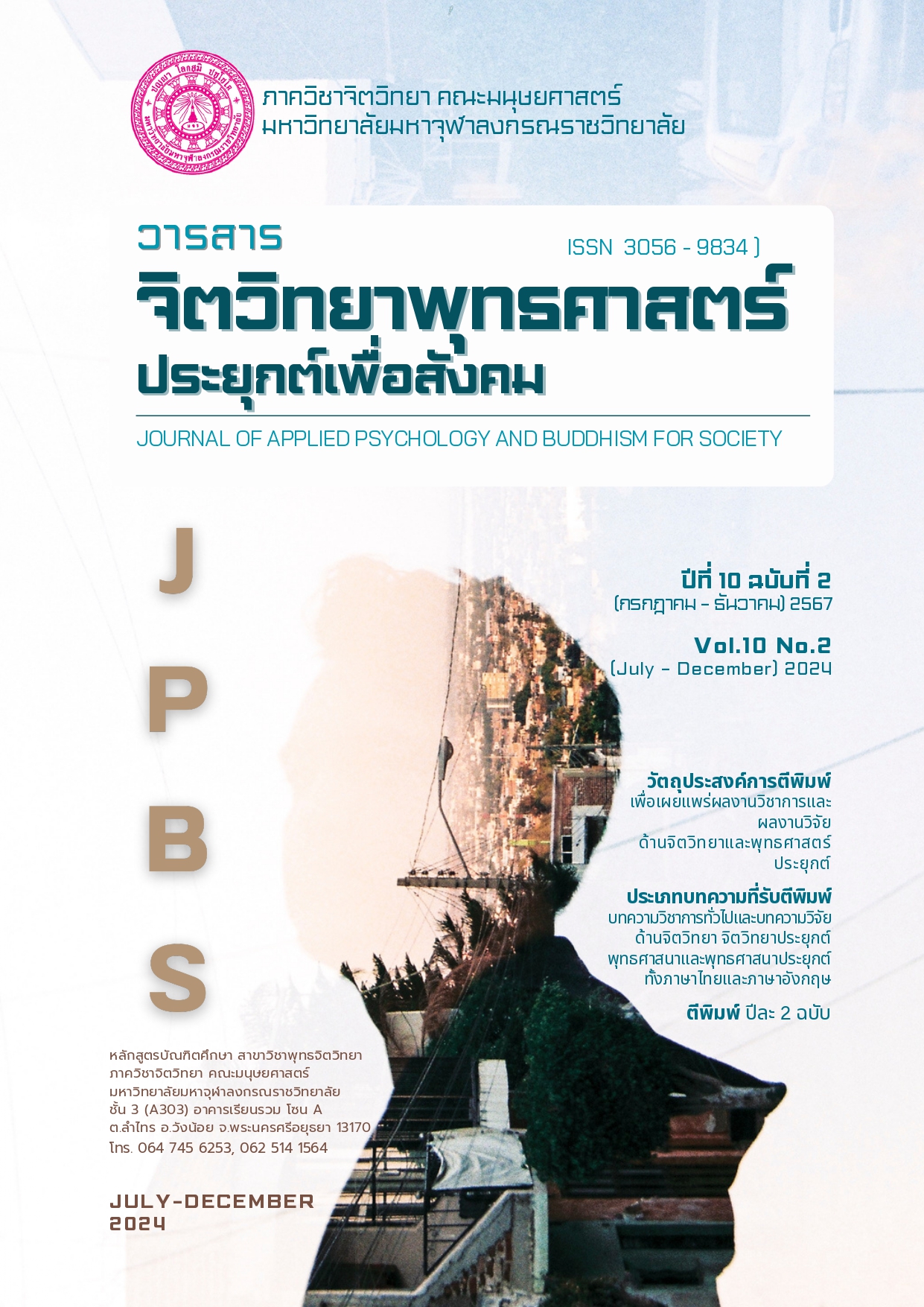Leadership Development Model for Enhancing Happiness In Organizations with Modern Management Innovations Based on Buddhist Psychology
Keywords:
Leadership, Enhance Well-being, Organization, Innovation, Buddhist PsychologyAbstract
This research aims to: 1. Study the characteristics of leadership for promoting well-being in organizations of modern management innovation, 2. Investigate the process of developing leadership for promoting well-being in such organizations based on Buddhist psychology, and 3. Propose a model for developing leadership for promoting well-being in organizations of modern management innovation according to Buddhist psychology. The study adopts a qualitative research approach, using in-depth interviews with 21 key informants, focus group discussions with 12 experts, and connoisseurship seminars with 11 specialists to validate the proposed model. Data were analyzed using qualitative analysis methods.
The findings reveal that: 1.The characteristics of leadership for promoting well-being in organizations consist of eight traits: shared vision and goals, building positive relationships and trust, effective communication, creating a health-promoting work environment, appreciation and rewards, setting a good example, inspiring others, and continuous self-development. 2. The process of developing leadership for promoting well-being based on Buddhist psychology involves five steps: 1) Internal leadership development focusing on mindfulness, concentration, and wisdom, 2) Building good relationships with subordinates, colleagues, and stakeholders, 3) Creating an organizational culture that supports health and well-being, 4) Applying technology, especially mindfulness apps and online learning platforms. 3. The ANAT 25 Model for developing leadership for promoting well-being consists of: 1) Four characteristics of leadership for promoting well-being, 2) Well-being at the individual and organizational levels, and 3) The application of Buddhist principles (Brahmavihāra, Iddhipāda, and Trisikkhā) and Bernard M. Bass’s transformational leadership theory to manage organizations in modern innovation with a digital management system.
References
คณะกรรมการวัฒนธรรมแห่งชาติ. (2563). จิตวิทยาตามแนวพุทธศาสตร์ เล่ม 3 ภาค 3 และ ภาค 4. กรุงเทพฯ : กระทรวงศึกษาธิการ.
จำนงค์ อดิวัฒนสิทธิ์. (2565). สังคมวิทยาตามแนวพุทธศาสตร์. กรุงเทพฯ : มหาวิทยาลัยมหาจุฬาลงกรณราชวิทยาลัย.
ทัซซิงก์ ไลล์. (2562). จิตวิทยาเพื่อชีวิตที่ดี [Psychology for Better Living] (วารุณี อมรทัต, ผู้แปล). กรุงเทพฯ : สำนักงานคณะกรรมการวิจัยแห่งชาติ.
นัฐกานต์ ฐิติจำเริญพร และ กัลยกิตติ์ กีรติอังกูร. (2561). ปัจจัยที่มีอิทธิพลต่อพฤติกรรมเชิงนวัตกรรมของพนักงานองค์การธุรกิจของบริษัทโตโยต้า ไดฮัทสุ เอ็นจิเนียริ่ง แอนด์ แมนูแฟคเจอริ่ง จำกัด. Veridian E-Journal, Silpakorn University (ฉบับภาษาไทยสาขามนุษยศาสตร์ สังคมศาสตร์ และศิลปะ), 11(2), 651-669.
พลอาสาสมัคร อนุกูล บุญรักษา. (2554). การพัฒนาทรัพยากรมนุษย์ตามหลักภาวนา 4 ของกองบัญชาการ มณฑลทหารบกที่ 31 (วิทยานิพนธ์ปริญญาพุทธศาสตรมหาบัณฑิต สาขาวิชารัฐประศาสนศาสตร). มหาวิทยาลัยมหาจุฬาลงกรณราชวิทยาลัย. กรุงเทพฯ.
สมแพง อินอาน, สายันต์ บุญใบ และ สุรัตน์ ดวงชาทม. (2566). รูปแบบการพัฒนาภาวะผู้นำของรองผู้อำนวยการโรงเรียนมัธยมศึกษาในภาคตะวันออกเฉียงเหนือ. วารสาร มจร พุทธปัญญาปริทรรศน์, 8(2), 65-76.
อดิเรก วรรณเศียร. (2566). การพัฒนาแบบจำลองแบบสมบูรณ์ในการบริหารโดยใช้โรงเรียนเป็นฐานสำหรับสถานศึกษาขั้นพื้นฐาน (วิทยานิพนธ์ครุศาสตรดุษฎีบัณฑิต สาขาวิชาบริหารการศึกษา). จุฬาลงกรณ์มหาวิทยาลัย, กรุงเทพฯ.
Brown and Moberg. (1980). Organization Theory and Management : A Macro Approach, New York : John Wiley & Son, Inc.
Brulde, B. (2023). Happiness Theories of the Good Life. Journal of Happiness Studies, 2007, 8(1), 15-49.
Bycio, P., Hackett, R. D., & Allen, J. S. (1995). Further assessments of Bass's (1985) conceptualization of transactional and transformational leadership. Journal of Applied Psychology, 80(4), 468–478.
Calhoun, James F. and John R. Acocella. (2021). Psychology of Adjustment and Human Relationship. New York: Random House.
Hausser, D.L. (2021). Comparison of different models for organizational Analysis. New York: john Wiley & Son.
Yahaya, R. and Ebrahim, F. (2016) Leadership Styles and Organizational Commitment: Literature Review. Journal of Management Development, 35, 190-216.
Downloads
Published
How to Cite
Issue
Section
Categories
License
Copyright (c) 2024 Journal of Applied Psychology and Buddhism for Society

This work is licensed under a Creative Commons Attribution-NonCommercial-NoDerivatives 4.0 International License.






